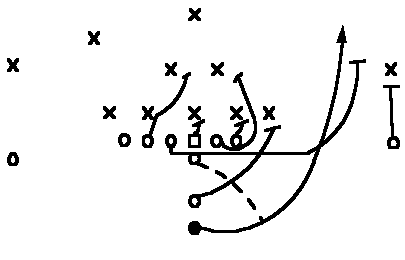Talent Management Systems Design – The Best Defense is a Good Offence
By Michelle Malay Carter on February 13, 2008
 In my last post, I took a stand against annual, mandatory low performing employee cuts popularized by Jack Welch at GE.? I believe this practice is rooted in an untrue, negative belief set.
In my last post, I took a stand against annual, mandatory low performing employee cuts popularized by Jack Welch at GE.? I believe this practice is rooted in an untrue, negative belief set.
Cutting the bottom 10% annually is a defensive, compensatory system for lack of understanding of work levels, human capability, and an inadequate and/or misinformed?managerial leadership framework.
Low performance will always be an issue within organizations, but below is my suggestion for taking a proactive stance by creating an environment for exceptional performance through systems design?rather than relying on a compensatory, reactionary approach.? What would I do?
- Design my organization using a work levels approach, i.e. exactly one role in each level, to facilitate natural, vertical flow of communication and leadership.
- Institute a two-level accountability model with managers-once-removed having specific talent management accountabilities in relation to their direct reports-once-removed.
- Train my managers on appropriately matching employees to roles.
- Train my managers to properly diagnose performance issues to clearly identify if performance issues are the result of:
- Employee mismatched to role – using a three factor model
- Employee mismatched to manager.
- Improper organizational design – too many or too few roles within a reporting chain.
Unclear or conflicting accountabilities and authorities.
- Equip my managers with the authority to refuse the appointment of an unacceptable candidate or to remove one.
- Ensure managers have the sole authority to assign or approve all work given to direct reports.
Grant managers the authority to review, recognize and reward employees (within company boundaries).
Let’s Stop Being Unfair and Cruel
We have got to move away from the idea that the factors that influence employee performance lie within the employees themselves.? Quite frankly, much of it is outside their control.? Yes, they need to bring their full effort to work everyday but beyond that much of the influence shifts to the manager and the systems within which they are operating.? Obviously, some things are beyond anyone’s control.? Hence, assessing performance as a substitute for overall effectiveness is ludicrous and cruel.? But that’s a topic for another day.
I’m OK.? You’re OK.? Let’s fix the system.
Are you a manager?? Is there anything on my list that you do not have?? How does it affect your work?
Photo Credit:? Football.com
Filed Under Accountability, Corporate Values, Employee Engagement, Executive Leadership, Managerial Leadership, Organization Design, Requisite Organization, Strategy, Talent Management
Comments
6 Responses to “Talent Management Systems Design – The Best Defense is a Good Offence”

One of the things you don’t mention is that in many jobs it is impossible to quantify “performance”. So these systems create a faked up performance system. They’re very effective in getting rid of innovators, those who are burning capability.
An ex-client of mine used to work in that system. He said that what it really allowed you to do was correct for the mistakes you made in hiring. It also meant that he had to make purposeful “mistakes” in hiring, so that he could keep the staff he wanted. So 10% of his slots were for getting fired not for ever doing work. He’d hire people he knew would fail.
Hi Forrest,
Thanks for stopping by. You bring up a good point. We have tried to take the judgment out of performance management and make it objective. It can’t be done although we pretend it can – fooling ourselves by thinking if we can put numbers to it, then it is objective (and if it’s objective, we won’t get sued).
Michelle
Hi,
Some companies, especially Aerospace, take this to new lows. At one large company where they had to plot everyone on a Bell Curve, the manger plotted the people and then back filled to justify. This number based evaluation gave the appearance of quantitative, but the manager admitted it was all subjective. At another company they cut 10% out of each group every other year. Which lead to the strange behavior of groups with large amounts of work needing to borrow people from other groups to fill in the hole left when they eliminated the 10%. In most of these cases, it supported managerial laziness in hiring, training, and job assignments.
While I have had some good bosses and have gotten value from some evaluations, too many times they become a tool for management by fear.
Mike
Department of Doing
Mike,
Thanks for dropping by and for your comment. Yes, since work is a about judgment and decisions – a mental process, then an environment of fear will interfere with productivity.
There is a better way.
Michelle
I don’t completely ascribe to Welch’s model as I don’t believe in firing the bottom 10%. I see that as a driving through fear, not a compulsion for excellence. My opinion is that those worthy of termination should be gone much sooner than evaluation time. I do however believe in using the Welch apportionment for issuing monetary awards.
Given that I know that the lower 10% have the capabilities necessary to do what is needed and choose to not put forth the necessary effort to excel. The world is full of those that are satisfied with mediocrity as their priorities for excellence lie elsewhere, and that is okay.
I do think that systems often times do get in the way of employee performance, however, I also believe that no matter how good or perfect the system is, it still relies on human nature, which is still ruled by individual will and choice. Every individual should be accountable to themselves and to others, which includes managers. If “the” system is getting in the way of excellent performance, then it is up to the manager AND the employee in collaboration to make that determination or at least create enough awareness to make others take note.
We (executives, managers, workers, etc…) all have responsiblity within any system to which we are a part of. To let someone “off the hook” for their responsiblity weakens even the best of managerial systems.
Bo,
Thanks for stopping by and commenting. I agree with all your points here. Differential pay is appropriate.
All humans strive for excellence in thier area of passion. Sometimes their passion falls outside their job.
Systems can get in the way of work. When we discover this, we are accountable to raise the issue to fix the system. Once, you begin to work outside the system, you are on a slippery slope to anarchy.
I look forward to a continued dialog.
Regards,
Michelle